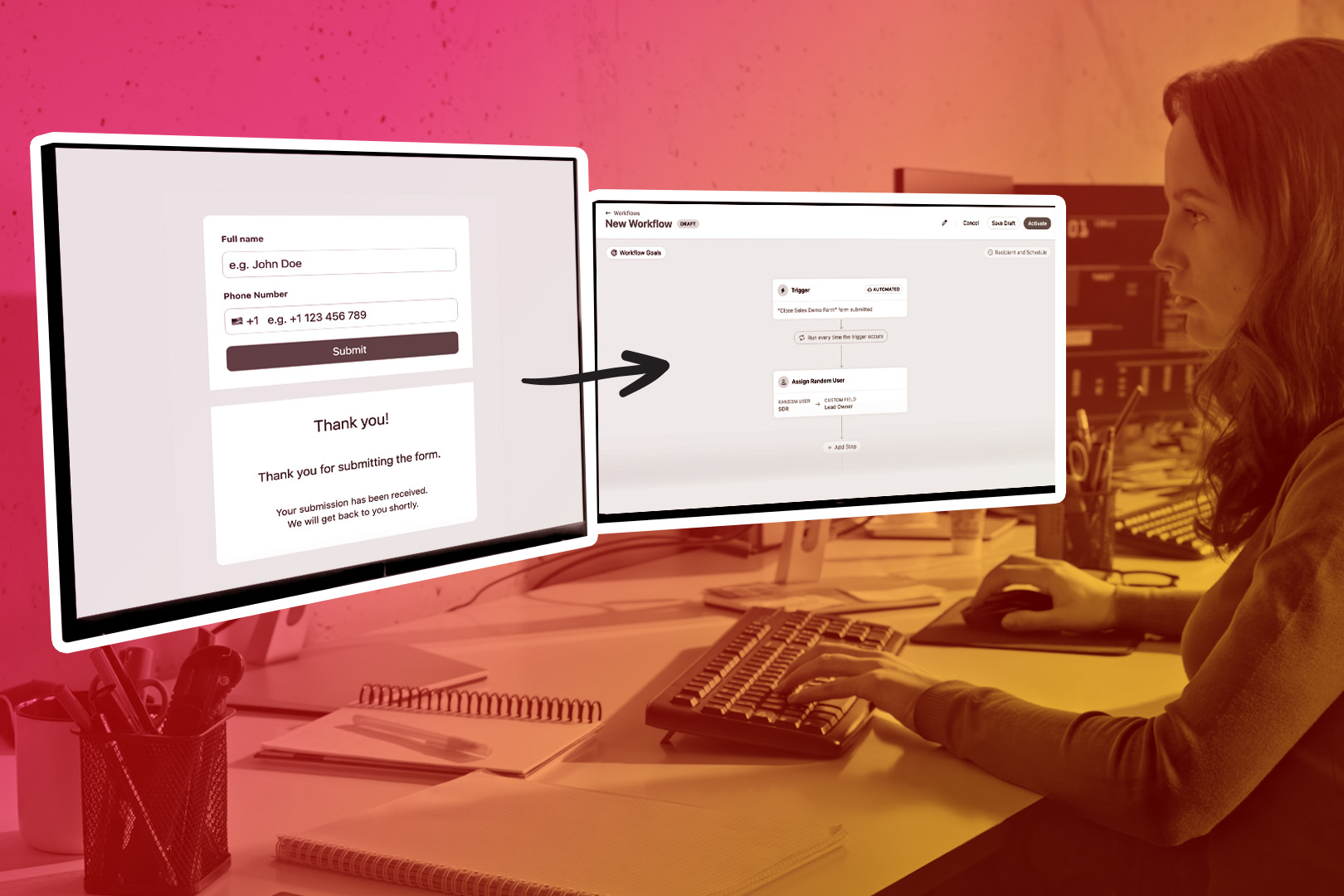“Oh, uh … This is, um, Joe from … uh … ABC Inc. I was calling about, uh …”
We all know the feeling of leaving a cringe-worthy voicemail, whether on the answering machine at your grandparents’ house or the business phone of a potential customer.
Something about the phrase “Leave a brief message at the beep” puts us on edge. Then, we completely forget what our message was supposed to be about in the first place.
That's probably why most voicemails suck.
A sales voicemail can either prime a callback—or get ignored. That's why you need to use proven sales voicemail scripts and timing to tilt the odds your way.
You want to achieve the former—but how? Is there a trick to leaving sales voicemails that get callbacks? Actually, yeah. If you call during normal business hours and leave messages using proven sales voicemail scripts, your response rates will improve.
Lucky for you, here are 13 top-level voicemail scripts—plus strategies to optimize your approach.
What is a Sales Voicemail Script?
In a perfect world, you wouldn't need voicemail scripts. You'd reach your prospects 100 percent of the time, make an amazing first impression, and then book a future appointment before hanging up the phone. Every. Single. Time. But we all know that's unrealistic.
It takes an average of eight cold call attempts to connect with a prospect. Know what that means? To succeed in sales, you must leave voicemails.
And if you're going to leave voicemails anyway, you might as well do it right. So, let's talk about the essential elements of response-worthy voicemails.
Essential Elements of a Sales Voicemail (for Callbacks)
A sales voicemail should not be something you make up on the fly. Instead, every voicemail you leave should have a specific goal and include clear next steps.
Think of your voicemail as a teaser for the actual conversation you were hoping to have when you dialed the prospect's phone number. As such, it should include:
- Your Name: Your prospects receive a lot of phone calls. If you don't tell them who's calling, they won't remember you, and your voicemail will go to waste.
- Your Company: Your name is great. Your name and your company is way better. A professional voicemail greeting includes both.
- Why You're Calling: You didn't call to shoot the breeze, did you? Tell prospects why you called and, just as important, why they should care.
- Your Contact Information: Want to receive a callback? A good voicemail greeting will include callback details so that prospects can actually call you back.
- A Specific Next Step: Finally, end your voicemail with a next step. This could be a call-to-action: "Call me back so we can discuss this further." Or details about your plans: "If I don't hear back, I'll reach out again [Insert Timeframe]. Have a great day!"

It doesn't matter what company you work for, who you're calling, or the VoIP phone system you use—the best sales voicemails include each of the five essential elements above.
Should You Leave a Voicemail When Cold Calling?
Yes—always leave a cold calling voicemail: it boosts brand recognition, warms future connects, and increases meeting-set rate.
As mentioned earlier, you probably won't connect with prospects the first time you call them. People are busy. They don't have time to answer the phone—especially on a business day.
If you don't leave a short message, your prospects won't know that you tried to reach out. And if they don't know that you tried to reach out, they won't call you back.
No bueno.
If you want to help your sales team achieve greater success, leave a detailed message (as described in the previous section) after every cold call. This will help you connect with more potential customers, increase brand recognition for your company, and boost sales.
Why Sales Voicemails are Worth the Effort
I know what you're thinking: "If I master the strategies you’re about to share with me or copy the best sales voicemail scripts I can find, I'll always get callbacks, right?"
Frankly, no. But that doesn't mean you shouldn't leave them.
First, a voicemail places a higher value on whatever you’re offering. Why? Because it's 2024, and people only leave voicemails if it’s important. Your voicemail recording will subtly suggest to prospects that what you have to say is worth their time.
Second, voicemails increase brand recognition. You may not receive a callback. But your prospect will undoubtedly listen to your message. Once they do, your name will get logged away in their brain, and they'll remember who you are the next time you reach out.
Third, a voicemail can help you get in touch with the right person. Maybe you called Sally when you should have called Sue. Your voicemail will explain to Sally what you're trying to accomplish. She may call you back after listening and give you Sue's contact information.
If that happens, you can call Sue during normal office hours and tell her that Sally referred you. This will automatically make your call seem more important. Win!
At the end of the day, a great voicemail message is part of your sales process. It’s a foot in the door that humanizes you and may get you an actual conversation down the road.
8 Strategies to Leave Voicemails That Get Callbacks
Or at least get your prospect's attention!
1. Avoid Making Your Voicemail a Commercial
Remember this fact: You CANNOT sell in a voicemail message.
Your sales pitch has its own time and place, separate from your voicemails. This is why you should give essential information, then tease the interesting bits for a future conversation.
The goal is for prospects to know who you are and why you're calling, but be left wanting more. If you can achieve this, you'll get way more callbacks. Guaranteed.
2. Correct Your Pacing and Cadence
The sound of your voicemail message can greatly impact how you are perceived. Because of this, I suggest working to improve your voice quality. Basically:
- Speak at a volume that makes you sound confident and engaged.
- Don’t rush through your message, but speak normally to ensure clarity.
- Eliminate "ums" and "uhs" to appear more intelligent and to create attractive urgency.
While the tone of your voice and the cadence of your sentences may seem trivial, they aren't. You need to pay attention to these details to leave professional voicemails.
3. Speak with the Same Energy You Would if They'd Answered the Phone
Energy is important when speaking on the phone—even if there isn't anyone on the other end of the line. So, make sure you sound active and engaged while leaving voicemails.
This isn't hard to do. Most sales reps take time to get amped up before making cold calls or talking to potential customers. Just ensure that the excitement you build carries over to your messages, too. Don't let it die if no one answers the phone.
Usually, this means speaking with a bit more enthusiasm than feeling comfortable in the moment. Trust me—it’ll sound just right when you listen to the voicemail.
4. Include Only the Essentials in Your Message
Every article about sales voicemails will tell you to limit your messages to 30 seconds or less. But many of those articles list five minutes worth of content you just "have" to include.
That’s not going to happen.
Instead, pare your voicemail script down to the bare essentials or use talk tracks. Think: What do my prospects actually need to hear in this voicemail? Are there any points that would be better to discuss in our next conversation or in an email?
Let the situation dictate what your contact needs to hear. Make a list of points you want to cover in your voicemail and see if you can remove any that aren’t necessary.
5. Listen Back to Your Recorded Voicemails to Improve Your Technique
Yes, we all hate listening to our voices.
But by listening back to the voicemails you leave, you can spot specific areas where you need to improve. It's one of the fastest ways to become a cold-calling pro.
You can even ask for outside feedback from your sales manager or a colleague. Do they have any advice on how to improve your sales voicemails? If so, implement it.
We'll share a few of the best voicemail greeting examples in the next section. But you'll still need to customize them to fit your company and target audience. Listening to your recorded voicemails will help you customize them correctly and connect with more leads.
6. A/B Test Your Sales Voicemails (Especially the Ones You Leave a Lot)
A/B testing lets you see which version of your sales voicemail greeting script works best with prospects. After a few tests, you should be able to pinpoint a perfect voicemail blueprint.
Does your target market respond better to social proof or a specific benefit in your voicemails? Should you tease said benefit before introducing yourself, or is it better to state your name and company first? Will funny voicemail greetings get you more callbacks?
If you often leave a certain type of voicemail (e.g., a cold-calling voicemail), it makes sense to A/B test your results. Track metrics such as callbacks or responses, and then double down on it.
7. Use Pre-Recorded Sales Voicemails to Scale Your Outreach Process
Dropping recorded voicemails can save you tons of time every week.
Think about it: you've spent hours leaving messages manually. You could win these hours by leaving pre-recorded voicemails with each prospect's answering service.
In Close, you can drop a pre-recorded voicemail as you call new leads, saving yourself the hassle of leaving manual voicemail after manual voicemail. Here’s how:
- Go to Settings > Phone & Voicemail > Pre-Recorded Voicemail Drop
- Click ‘New Voicemail Drop’
- Record your voicemail or upload a recording file

Now, you can leave a voicemail message from the calling page when someone doesn’t answer.

After you leave your voicemail, a call note will automatically be added to your lead’s profile, saying that you left a voicemail. Hooray for automation!
The only downside of leaving a pre-recorded voicemail is that you won't be able to mention the prospect's name or company. This means that your messages won't feel as personal.
But for those who make a high volume of calls and already have a perfect sales voicemail they've A/B tested, voicemail drops can be a huge timesaver. (This is especially true for those who sell in the small business space and don't have extra time to waste.)
Discover more intuitive calling features in Close and sign up for a 14-day free trial.
8. Keep Following Up
Dropping your voicemail isn’t the end. It’s up to you to keep the conversation moving forward.
We all know that most cold call voicemails won’t get a callback. And that’s okay. If you’ve done your job right, you'll get your prospect's attention, at the very least.
So, keep following up. With the right technique, you'll eventually get the result you want.
Just remember: You can follow up in multiple ways. Yes, you can keep cold calling your prospects—and you should. But you can also send them emails and text messages. Or make use of social media platforms like LinkedIn. A multi-channel approach to follow-up is ideal.
13 Sales Voicemail Scripts to Use in Any Sales Situation
Just like a cold call script, leaving a scripted voicemail message will help you stay on track and hit all the essential points (without rambling).
Below are 13 of the best sales voicemail scripts we’ve encountered, separated into seven categories to help you know when to use what.
Basic Customizable Sales Voicemail Script
Back to basics. Let’s start with a simple voicemail script that includes all of the essential pieces of a voicemail that we mentioned at the beginning of this article.
1. Basic Voicemail Script
This voicemail script can be used as a backup in a pinch or customized to fit your needs.
Cold Calling Voicemail Scripts That Pique Interest
How many times do you get sent to voicemail when cold calling? It’s inevitable. So, if you do a lot of cold calling, you’ll really need to hone that professional voicemail message.
Use one of these three scripts to generate curiosity in your prospects.
2. Will Barron’s Sales Voicemail to Build Trust and Authority
Will says that he’s not expecting a callback from this message.
Instead, he wants his prospects to listen to his voice, start to build trust in him as an authority, and see that he’s going to be relentless in his follow-up.
3. John Barrows’ Cold Call Voicemail Script to Generate Responses
The goal of John’s voicemail script is to get a callback.
He piques interest and reverses the normal format by introducing himself at the end, asking for a callback, and sharing his phone number—not once, but twice.
4. Cold Calling Voicemail Script to Create Urgency
By mentioning specific results and a clear timeframe, this voicemail script builds curiosity as well as a real level of urgency. As such, it increases the likelihood of a return call.
We should mention that this voicemail script can easily be turned into one of the best holiday voicemail greetings, too. You could, for example, change the last line to:
"Call me back at [phone number] this week and let’s see what we can do to help you take full advantage of the holiday buying season this year."
Pretty enticing, right?
Prospecting Voicemail Script That Builds Trust with Transparency
During the prospecting and discovery phase, you do research to decide if your current lead is a good fit for what you have to sell. So, a prospecting voicemail script should absolutely avoid a pitch and focus on matching your product to this specific lead’s needs.
5. Transparent Prospecting Script
This script makes it clear who the product is for, and does its best to match their needs.
Follow-Up Voicemail Scripts That Prove You’re Worth Their Time
Following up after a cold email can be tough. Here are a couple of scripts that will help bring your message to the forefront of your prospect’s mind.
6. Florin Tatulea’s 10-Second Follow-Up Voicemail
Once again, the purpose of this voicemail script isn’t to get a callback. It’s to direct the prospect’s attention back to your original email.
This email + call combo is a great way to capture attention and narrow it down to a single, specific next step. (In this case, the step is replying to your email.)
7. The Yes or No Follow-Up Voicemail
One of the best ways to increase your response rate is to make it as easy as possible for the person on the other end of the line.
Here’s a follow-up voicemail script that does just that:
8. The Final Follow-Up Voicemail
Cold outreach should only go so far. At some point, you'll need to break up with the lead.
While the breakup email is the most common way to do this, you can follow the same formula and leave a breakup voicemail instead. Here's how it's done:
Referral Voicemail Scripts to Maximize Your Name Drops
Referrals are a great way to increase sales, but what if the referred lead doesn't pick up the phone? Here’s a sales voicemail script to name drop and get away with it:
9. The External Referral
When the referral is from someone outside the company, but within your prospect’s network, use a voicemail script like this:
10. The Internal Referral
What if your first contact in a company is an end-user, not a decision-maker?
While the end-user may be a great internal champion for your product, they’re not the person with the power to purchase. They can refer you to the right person, though.
Here’s a voicemail script for a referral that comes from within the prospect’s company:
Inbound Sales Voicemail Scripts
With inbound sales, your outreach can be a bit more direct. After all, the prospect has already shown interest in you or your product and is expecting to hear from a salesperson.
Here are a few voicemail message examples you can use, depending on how the inbound lead came into your pipeline.
11. Voicemail Template for Leads That Requested a Demo or Callback
12. Voicemail Template for Leads That Downloaded a Piece of Content
Message Script for Gatekeepers
Okay, you got me; this one isn’t actually a voicemail message.
However, sometimes when cold calling, you come to a gatekeeper who won’t let you talk with the decision-maker.
In this situation, it’s ideal to have a short message that will pique the interest of the decision-maker and get them to place more priority on your next call or email.
13. The Gatekeeper Message that Generates Interest
Thanks for taking a message. Just let her know that Steli from Close called to talk about reducing turnover on the sales team. I know she’s been having some issues with this recently, and I wanted to see if we could help each other out.
The key is to reduce risk for the gatekeeper. It’s their job to make sure the decision-maker isn’t flooded with sales calls all day. Use proper research to make your message super-relevant to the people involved and you’ll prove that your call is worth their time.
Create Your Own Sales Voicemail Script
The best voicemail script will depend on the people you sell to, the product or service you have to offer, and the specific goal you want to achieve. Top sellers understand how these three things work together and how to use them to pique a prospect's interest.
But, more than anything else, your success with voicemail scripts will depend on your attitude.
Are effective voicemails guaranteed to get callbacks? Nope. But they can generate interest and build trust for the next time you connect with that person.
With the right attitude and a bit of work, you can craft concise, effective sales voicemails that get people interested in what you’re offering.
Better yet: With Close CRM, you can drop a recorded voicemail automatically as you go through your calling list, allowing you to connect with more prospects in less time.













.jpg)
